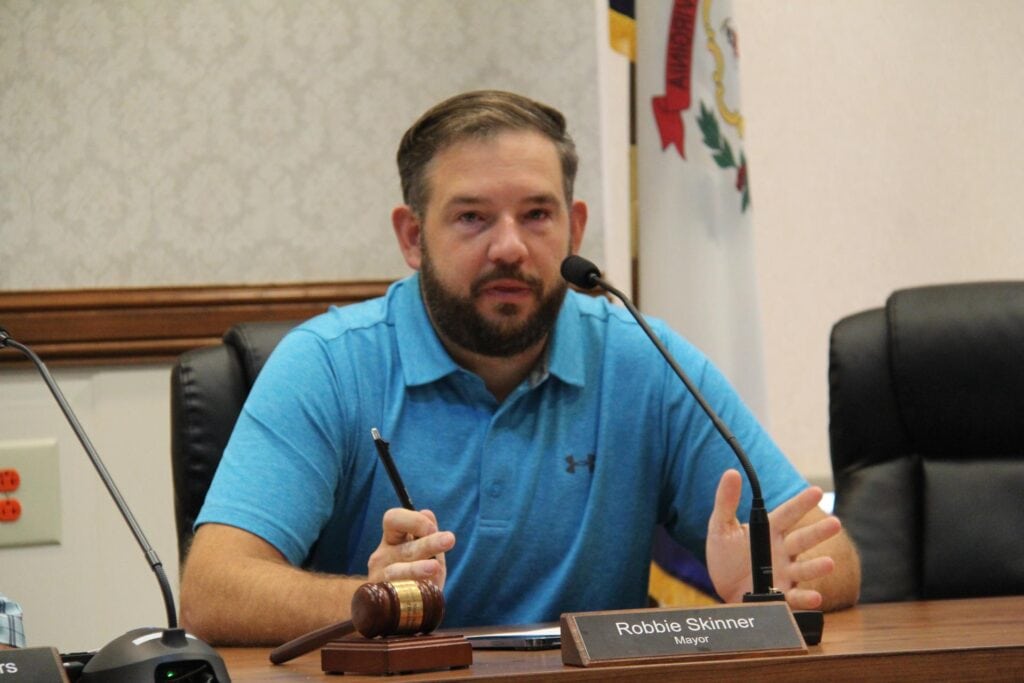BUCKHANNON – When West Virginia Governor Jim Justice ordered public schools to close at the day’s end on Friday, March 13, that act tossed the state education system into a new realm.
It sent school officials scampering into action to ensure that students not only remain fed, but that the education process continues for those in grades pre-K through 12.
Upshur County teachers say they’ve been striving to devise new and innovative ways of delivering material to students who are no longer present in the traditional classroom setting. In fact, local elementary school teachers say there’s been a lot of learning going on – and not just by the students. Teachers have not only learned how to deliver lessons virtually, parents and guardians have learned what their students are being taught – and how they’re learning – on a daily basis.
Rock Cave Elementary School
Beverly Davis, first-grade teacher at Rock Cave Elementary School, hit the ground running to make sure her students had everything they needed – especially those students who do not have access to the internet.
Davis said she made math and reading packets for those students and worked hard to make her students comfortable with the help of her significant other, David Taylor, who took pictures for a video she put together for her students.
“I wanted my students to have the feeling that they were actually standing in our classroom and wondering through our great school,” Davis said. “The soundtrack for the virtual field trip we went on was performed by a former first-grade student.”
Davis said as the video came together beautifully and when she saw the completed project, she sat down and cried.
“I cried tears for how much has changed in the last month, missing the smiles, hugs and stories from my students and a feeling of powerlessness because I can’t change this situation … but through this message, maybe I could provide my students strength and hope,” she said.
Her video of the school begins by showing the school and familiar sites in the building.
“I want to teach my students to live on Earth and how to face its struggles and its strife and how to improve their sense of self-worth – not just the lessons in a book or how the river flows – but how to choose the proper path, wherever they may go,” she said.
Davis, who has taught at RCES for 30 years, said she had to adapt overnight to a new style of teaching but is very excited to see how her students have risen up to meet the challenge and achieve success. She said she has nearly every student in a private Facebook group – her virtual classroom.
“Lessons are posted by 7 a.m. each morning and include daily activities in reading, science and writing using classroommagazines.scholastic.com,” she said. “The students enjoy the activities they are asked to complete and post their assignments on our page.”
Davis invited her students to help her put together a ‘Pledge to the Flag’ class video. She’ll them put together the video clips and share it with her students as well we local media “as a way to provide inspiration, strength and hope with their emblem of unity to others showing they are all in this together,” she said.
Another favorite of Davis’s students are video phonics lessons, which feature the class puppet, ‘Hopey.’

“I have included some read aloud stories just for fun,” Davis said. “I call each family who doesn’t have access to internet each week to check on how things are going and to see if there is any way I can help.”
Davis said she believes parents, grandparents, siblings and guardians can take advantage of having children in the home.
“This is the perfect opportunity for parents to teach life skills to their children so they can deal effectively with the demands and challenges of life,” she said. “When students learn by doing and experimenting that creates a problem solver. Any activity that uses all the senses helps the brain create pathways that make it easier and quicker to retain information.”
Davis said she and all her fellow colleagues are all trying to do the best for the students of Upshur County.
“We are facing the challenges head on. What we plant now will be harvested later,” Davis said.
Tennerton Elementary School
Tennerton Elementary kindergarten teacher Jenny DeLong has been teaching for 38 years. DeLong said her students are using a program called ‘Waterford’ at home, which they were also using in the classroom setting prior to the stay at home order. The program focuses on lessons utilizing a game and story format and includes reading, math and science.
“The lessons progress forward as the students master the skills,” she said. “I am able to see what skill the students are working on and what they are scoring. Currently, 60 to 75 percent of my students are using the program at home, which will help them maintain and increase learning skills to get them ready for first grade.”
Hodgesville Elementary School
Marlena Reed, who teaches third grade at Hodgesville Elementary School, has been teaching for 17 years. Reed said she feels the stay-at-home order not only changed the way lessons are being delivered, but also has the power to change methods in the future.
“I feel this has opened the door to more technology use in and out of the classroom,” Reed said. “The students are becoming pros at navigating the sites and using technology daily. We are creating self-motivated students who want to complete the to-do list using their Chromebook.”
Reed is also encouraging parents and guardians to find innovate ways to help students learn while at home by posting ideas which include having students write their ‘sight words’ outside with sidewalk chalk and taking a nature walk then writing about items found on that trek.
“In addition, I have had my students interview their parents and then write about their interview,” she said. “I also have had parents create a project for their child to do and then send me a video showing me what they completed.”
All in all, Reed said she feels students are making the best of learning during this stay-at-home order.
“My kids are liking this different way of teaching,” she shared. “They like the assignments that I have given them. I have a very independent class and they are taking this new ‘challenge’ and have rocked it!’”
Union Elementary School
Twenty-one-year veteran teacher Gabby Rhodes teaches third grade at Union Elementary School. She said she’d been able to continue teaching her students daily lessons via virtual methods.
“I use Educreations, which is a whiteboard and screen casting application that allows my voice to be recorded as well as my written examples on a whiteboard or current pages the students are asked to complete,” she said. “I can provide their daily math, grammar, spelling and writing lessons not much different that I could provide in the classroom.”
Rhodes said students watch the videos at their leisure and can replay the videos as often as necessary to grasp the learning concepts. She also provides her students with websites and applications that allow students to read a variety of articles and mobile books.
“For students who do not have the internet or devices at home, they were given the option to check out iPads from my classroom,” she said. “Videos and reading materials are able to be downloaded on these devices so the students do not need internet to complete daily assignments.”
Rhodes wanted to remind everyone that each school now has an open Wi-Fi hotspot for students to use that is available in the school parking lot. This allows students to access any digital content or download necessary files as they choose.
“I use YouTube to share daily read aloud, and my students have recorded themselves reading to the class, which I can share over ClassStory in an application called Class Dojo,” Rhodes said. “Students use the portfolio section to share weekly videos to let me know what they have learned and how they are doing during the pandemic. Currently, I have asked students to create a digital time capsule to record this time so they can remember it after the years have passed.”
While at home, Rhodes said her students have been asked to pick a room in their home and calculate the area of the room, thus calculating the amount of flooring they would need for the room.
“I also asked to write letters to local nursing homes where people are not receiving visitors as well as to essential employees thanking them for their sacrifice during this time,” she said. “Students cannot only practice correct letter writing but can learn how to address an envelope and calculate postage.”
In addition, Rhodes said teachers have encouraged students to learn a new hobby or skill such as sewing masks for volunteers, learning to play an instrument, practicing singing, keeping a journal, writing poems, drawing pictures, planting gardens and enjoying family time with board games and storytelling.
“I would like to thank the parents, grandparents and guardians during this time,” Rhodes said. “Many of them still continue to work while trying to help their children with schoolwork. I want to personally thank each and every parental figure in our community because you are the positive example of what it takes to endure and make it through unexpected and difficult situations.”
“You are a role model for your child, and I thank you for encouraging your child’s education and working collaboratively with their teachers during this time,” Rhodes added. “Truly, learning has left the four walls of the school building, and it is showing how the whole community is involved in the education of Upshur County students and how well we work together to help our youth. They are the future of Upshur County! For that, I am thankful for our small community and how we all come together for the students of Upshur County. It is truly remarkable!”
French Creek Elementary School
Mandi Neely currently teaches fifth grade French Creek Elementary School. She has taught 10 years in Upshur County and two years in Giessen, Germany. She said with the implementation of distance learning, there has been a learning curve.
“When this first started, I was far from being tech savvy,” she said. “I’ve had to spend hours upon hours watching tutorials on various programs and finding things that were user-friendly for fifth-graders wasn’t exactly easy.”
Neely said prior to the stay-at-home order, she communicated with families using Remind and her class’s Facebook group page.
“Now we use Zoom to connect,” she said. “I offered sessions multiple times a week for students to join and had more than 75 percent of my class in attendance. It is very easy to use, and the students love being able to see each other and ask questions. It allowed me to share my screen and show them many new links.”
Neely said because of recent security concerns, however, they’ve recently switched to Microsoft Teams.
“I have slowly introduced features to the students by having individual video chats and sharing my computer screen so they can view how I’m accessing things in real time,” she said. “Also, I have seen such an increase in familial involvement since the state-at-home order began and caregivers are joining their children on the video conferences and asking such great questions about how they can help their student be academically successful.”
“The stay-home order has caused us to really examine the meat of our standards and explore non-traditional ways for students to master them,” she said. “Since students vary in their learning styles, it only makes sense that they would be offered varied methods to show what they know. Many teachers are embracing these nontraditional assessments, and I truly look to see more cross-curricular projects applied in classrooms in the future.”
Buckhannon Academy Elementary School
Brittany Squires teaches first grade at Buckhannon Academy Elementary School and has taught there for seven years. She feels extremely lucky because her classroom is one-to-one with iPads.
“I have integrated technology for many years, and my goal was to have a balance of paperless assignments and paper-pencil assignments – I wanted to reduce waste but still ensure that my students were capable of those important skills such as cutting with scissors, proper pencil grip and coloring,” Squires said.
Squires said she has been using Classkick which enables her to simulate being in the classroom.
“I upload videos of myself teaching reading, math, phonics and writing lessons as if the students are sitting right in front of me,” she said. “I add slides that are engaging, not just a digital worksheet and try to use activities we would use in the classroom to keep consistency.”
Squires said she thinks the stay-at-home order is forcing teachers to become more familiar with technology.
“I think this will make teachers think about something like this happening in the future and how to be better prepared if something were to happen again,” Squires said.
And while students are at home with their parents or guardians, Squires encourages simple activities.
“Read with your child,” she said. “Talk to your child. Take this time to slow down and involve them in your daily routine. Teach them how to do chores, create and maintain a schedule, cook, or other life skills that are so important, but time doesn’t always allow for.
Squires wanted to send out a big ‘thank-you’ to parents.
“Thank you to all the parents who are doing their best for their children,” Squires said. “They are trying their hardest to keep their children safe, healthy and still somehow teach them. It’s not an easy job, and this is uncharted territory, but their hard work is not going unnoticed. I have heard a lot of positive things from the parents of my students. They are thankful for the resources that have been provided but more so, thankful for the relationships we are continuing.”
Washington District Elementary School
Jennifer Barry has taught for 10 years – five in Pennsylvania and five at Washington District Elementary School where she currently teaches fifth grade.
Barry said she hopes this new delivery of instruction will change learning by bringing parent and guardians face-to-face with the work their students are doing.
“It is my hope that when the parents and guardians see a student work in-depth, they will be able to understand the importance it holds and understand the struggles that students may face,” she said. “When families can see a student struggle, they are going to seek out help from that teacher before report cards or midterms are distributed.”
Barry said teaching from a distance has really made her get more creative with ways to engage her students in learning.
“I can’t physically be with them to see that they are engaged, so it has made me really seek out activities that I know students will be excited about regardless of my presence,” Barry said. “It has also made me look for meaningful learning experiences that I know I could easily bring into my classroom next year and add to my teacher’s tool-belt.”













